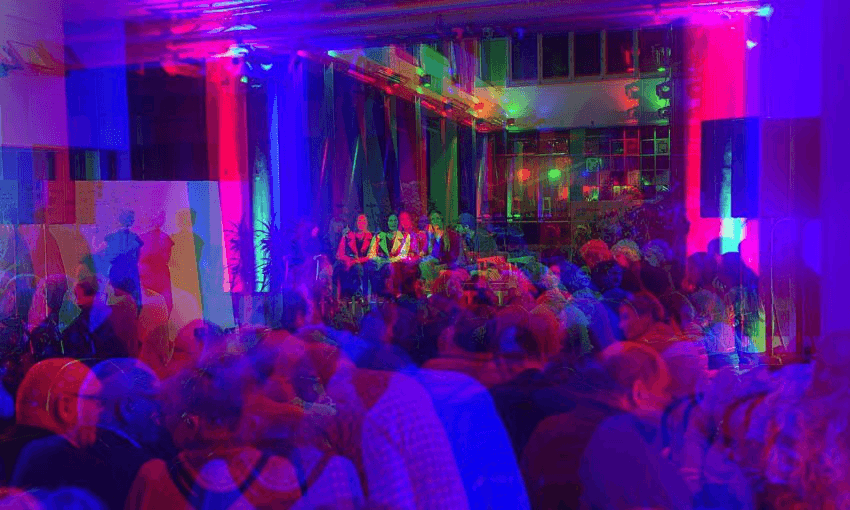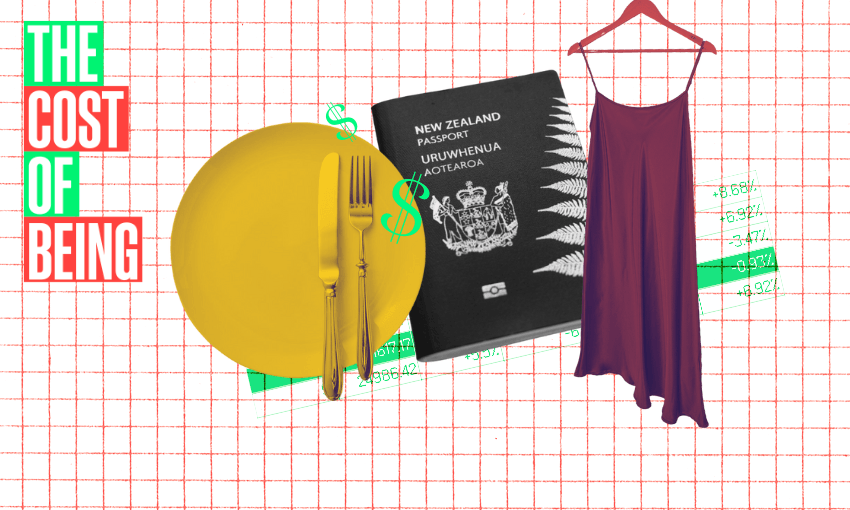The pressure group’s latest event focused on retail and hospo – and bringing back all those great vibes the capital once supposedly had.
Vision for Wellington’s third public meeting saw the supergroup of powerful Wellingtonians undertake an important side quest in the perilous mission to save the capital: locate Wellington’s missing vibes, specifically in the city’s businesses. A crowd of 100-or-so mostly grey heads gathered at The Exchange off Courtenay Place on Monday night to hear from the “new faces of hospitality and retail in Wellington” on how these industries could thrive in a city devoid of a “vibe we once enjoyed”.
That v-word and the following sentiment was repeated throughout the night – that Wellington was the coolest place to be about 10 years ago, then some kind of vibe shift happened, and now it really sucks and we’ve resigned ourselves to whinging about it. But what exactly occurred?
Did former mayor Celia Wade-Brown declare a rate increase based on the city having too much fun? Did a vortex briefly open in Lambton Quay, into which the locals threw all their hopes and dreams? Surely it couldn’t be the quadruple whammy of a massive earthquake, a pandemic, an incredible infrastructure deficit and a global recession? I guess you just had to be there.
The night’s panellists – or “disruptors at the door”, as the event put it – included Victoria McDowall (co-owner of eatery Fred’s Sandwiches and bar The Ram, both on Cuba Street), Nat Woodhall (of menswear boutique That Was Then, This Is Now), Mikey Venimore (of vintage store Preloved Charlies) and Tom Millot (of tiny Dixon Street restaurant Supra), with MC Chris Wilkinson, of First Retail, posing the “provocations”. His line of questioning on how the capital’s business scene became so vibeless and how this state could be reversed were pointed and returned a few good ideas, but not a whole lot of solutions – after all, three-quarters of the panel had lived in Wellington for five years or less.
A good indicator of city vibe levels is how its hospitality and retail sector is doing – bums on restaurant seats and items flying off the shelves indicate the public has enough dosh to keep the city’s financial eco-system flowing. Since the pandemic, these industries and their small players in particular have faced compounding struggles across the motu. Some days, the sunny ones especially, Wellingtonians pack these places out in hordes. On others, it’s about as alive as Invercargill.
So, how do we become a city that keeps businesses pumping day in, day out? Born-and-bred Wellingtonian Woodhall pitched some choice ideas: free parking in the city, improved public transport, to somehow incentivise hospitality as a viable career option and create affordability for students as well as a more accessible city. Meanwhile, Millot called for a focus on tourism to get both staffing and visitor levels up, while McDowall wanted more council support and mercy from “greedy” landlords.
Venimore, on the other hand, envisioned a “cosy” city. The 26-year-old was a great example of the “business for today” Wilkinson had raved that the city needed. She told the audience her boutique secondhand clothing store had one of its biggest sales days this year after the power of TikTok brought her business to the attention of a travelling Aussie, who made sure to stop by while in Wellington.
Her store doesn’t rely on foot traffic as much as it does social media, Venimore told the crowd. But, because this was a mostly older and male-strong crowd, her repeated mentions of TikTok had some of the audience members sniggering at her for reasons I can only chalk up to misogyny and perhaps jealousy.
On McDowall’s own admission, she wasn’t in Wellington to see what the vibe was like pre-vibecession, but agreed there was a real lack of it now. This was partly the fault of the media, which “has a lot to answer for”, she reckoned, for shoving so many negative stories about the city “down our throats”. Wellington had become a “self-fulfilling prophecy, because why would you want to live in a city that you’re constantly being told is dying?”
She had a point – the city’s local rag has a penchant for finding one or two people who are angry about something and making it into a city-wide issue. Good thing the owner of that paper was sitting in the front row and is also a Vision for Wellington board member, and seemed to be taking note of these concerns.
“Obviously we’re all going through a big transitional phase, and I think we’re all irritated by it right now,” McDowall said, “but in five years we’ll probably be very grateful for all the work that’s happening right now.” It was a pertinent point to make on the same day the Golden Mile construction on Courtenay Place kicked off, which has been criticised by businesses for its potential for disruption, though also has the potential to keep businesses thriving in the long run.
When the panel discussion wrapped after 45 minutes, the audience Q+A segment of the event had Wilkinson offering “provocations” for the audience to discuss in groups, and then share with the crowd. He first questioned how Wellington could better support its businesses, leading one hospo worker to remind the crowd that getting coffee is a privilege, not a necessity, and businesses should be able to charge what they’re worth.
One commercial landlord (“but she’s progressive!” Wilkinson said) suggested PikPok – a local software company whose research manager Emma Procter spoke at the first Vision for Wellington event – make an app where a user could travel through Wellington and see all the businesses laid out on a map, though had no suggestion for who would pay for the development of said app. One young man said young people were “too busy trying to make ends meet” to even consider opening a business.
Another woman was upset she had missed out on some sort of participation award for opening a business. “I’ve had no one from the council come in and say, ‘this is a great move you’ve done to support our city,’” she grumbled. “You pay a lot of rates – we pay a high rent – and you can’t have anyone come to say ‘well done.’”
It spoke to the overall vibe of the night: we’re here, we’re whinging, now won’t someone pat us on the back for giving a shit? We tell ourselves stories about our lives all the time – something like, “I peaked in my 20s, and now I’m old and have been made wise by the great disappointments of life” – to make sense of who we are and what’s happening around us. If the only stories we tell ourselves is that we as Wellingtonians are miserable and vibeless and can’t win our battles, then, as McDowall pointed out, we are destined to absorb it and live it.
But the business owners of today do have some very good ideas for tomorrow, it’s just a matter of whether the commercial landlords and media people (hi) sitting in the audience are willing to listen. Encouraging councils to support businesses – perhaps with a grant in a similar vein as the already existing City Growth Fund or Community Venue Assistance Fund – is a good shout, but comes at the risk of creating dependency and taking funding away from other projects.
Landlords always need to be less greedy. We always need to stop treating hospo workers like they’ve chosen some kind of non-career until we can roll them and their troubles out for the purpose of a political movement. Wellington does need more tourism, but it also needs a bloody good clean-up first. There’s a vision for a vibe-filled Wellington somewhere, but it wasn’t alive here.




